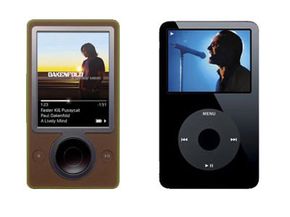For decades, iPod has dominated the mobile media market. OK, it's actually only been about nine years, but Microsoft has stepped into a world so completely ruled by Apple that Zune would pretty much have to unfold into a portable movie theater with reclining seats and free popcorn to really compete. It doesn't do that.
If you've read How iPods Work, you know all about the device. In short, the latest version of the iPod is a digital media player that can handle music, photos, podcasts, video, apps, games and with the flip of a setting, any file type at all in its portable-hard-drive mode. Its form factor is unfathomably compact, third-party programmers have developed all sorts of sweet hacks to expand and change its functionality, it's seamlessly integrated with the most popular media-download store in the world, and it works with Mac OS X and Windows XP/2000 or later.
Advertisement
So how does Zune HD stack up against the iPod touch? The general opinion is that Microsoft did all right, but maybe not quite enough to counter Apple's dominant grip on the MP3 player market.
Zune HD handles all of the basics -- music, video, podcasts, apps, games and photos. The Zune HD and the iPod touch 4G share many of the same features, including a touch screen interface and built-in WiFi. The Zune HD's screen is smaller than the one on the iPod touch -- 3.3 inches compared to 3.5 inches, respectively. The Zune HD also features an HD radio tuner, something the iPod touch doesn't have. But the newest iPod touch features two cameras -- the HD Zune doesn't have a camera at all.
Both the Zune HD and the iPod touch can export video, though you'll need additional accessories to pull it off The Zune HD can export video at 720p but its native resolution is standard definition. The newest iPod touch has a retina display and can show video at 720p.
The Zune HD also comes up wanting in a few other departments, including battery life. Apple claims the iPod touch can play music for up to 40 hours without recharging. Microsoft's Zune HD is rated for 33 hours of music before you'll have to plug it in.
The Zune HD comes in three different storage capacities: 16, 32 and 64 gigabytes. The iPod touch has a slightly different lineup with 8, 32 and 64-gigabyte models. One of the biggest differences between the Zune HD line and Apple's iPod touch is the price -- Microsoft's product is, on average, $50 less expensive than the comparable Apple product. As of this writing, Microsoft prices the Zune HD at $179.99 for 16 gigabytes, $229.99 for 32 gigabytes and $349.99 for 64 gigabytes. Apple's iPod touch retails for $229 for 8 gigabytes, $299 for 32 gigabytes and $399 for 64 gigabytes.
Advertisement

